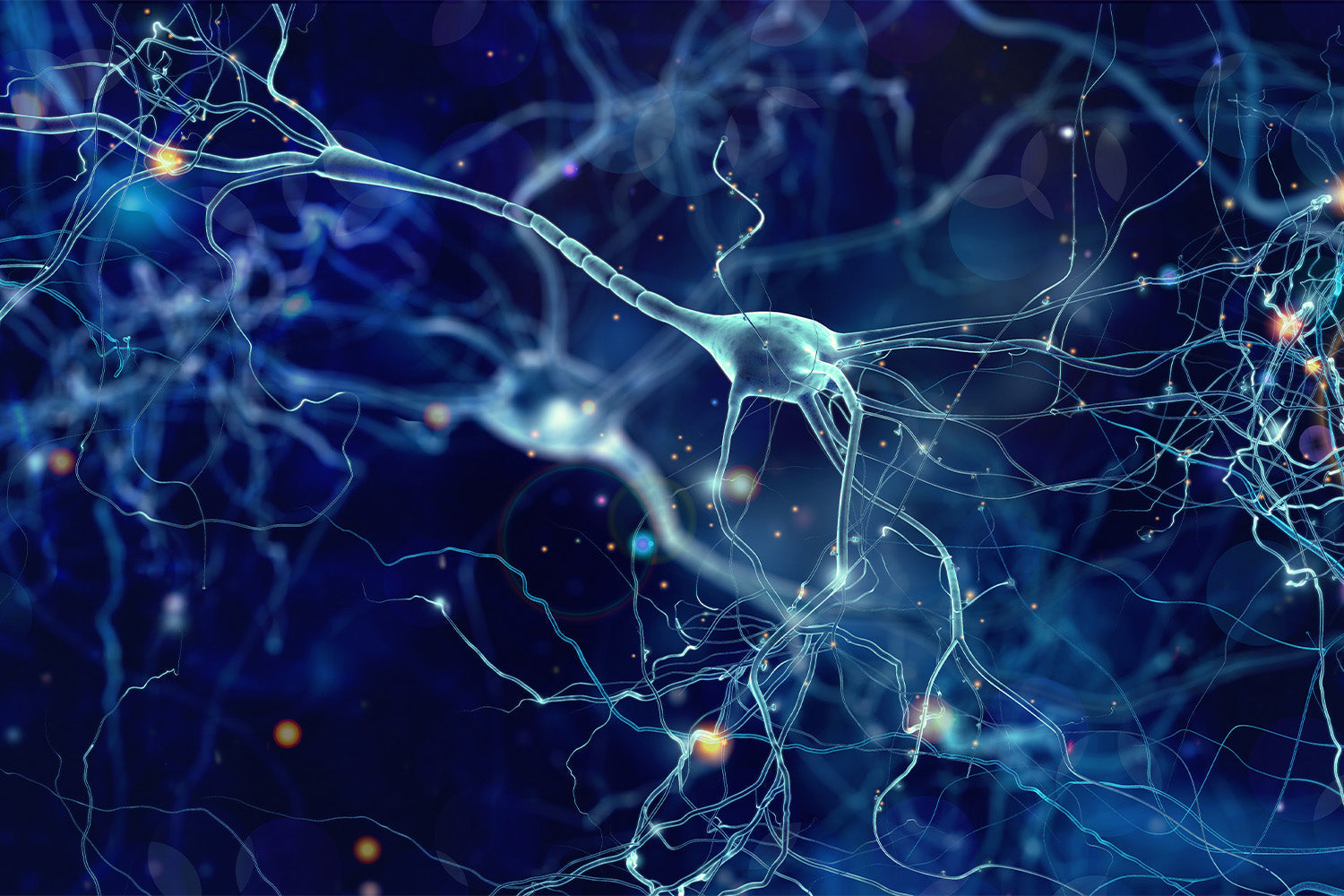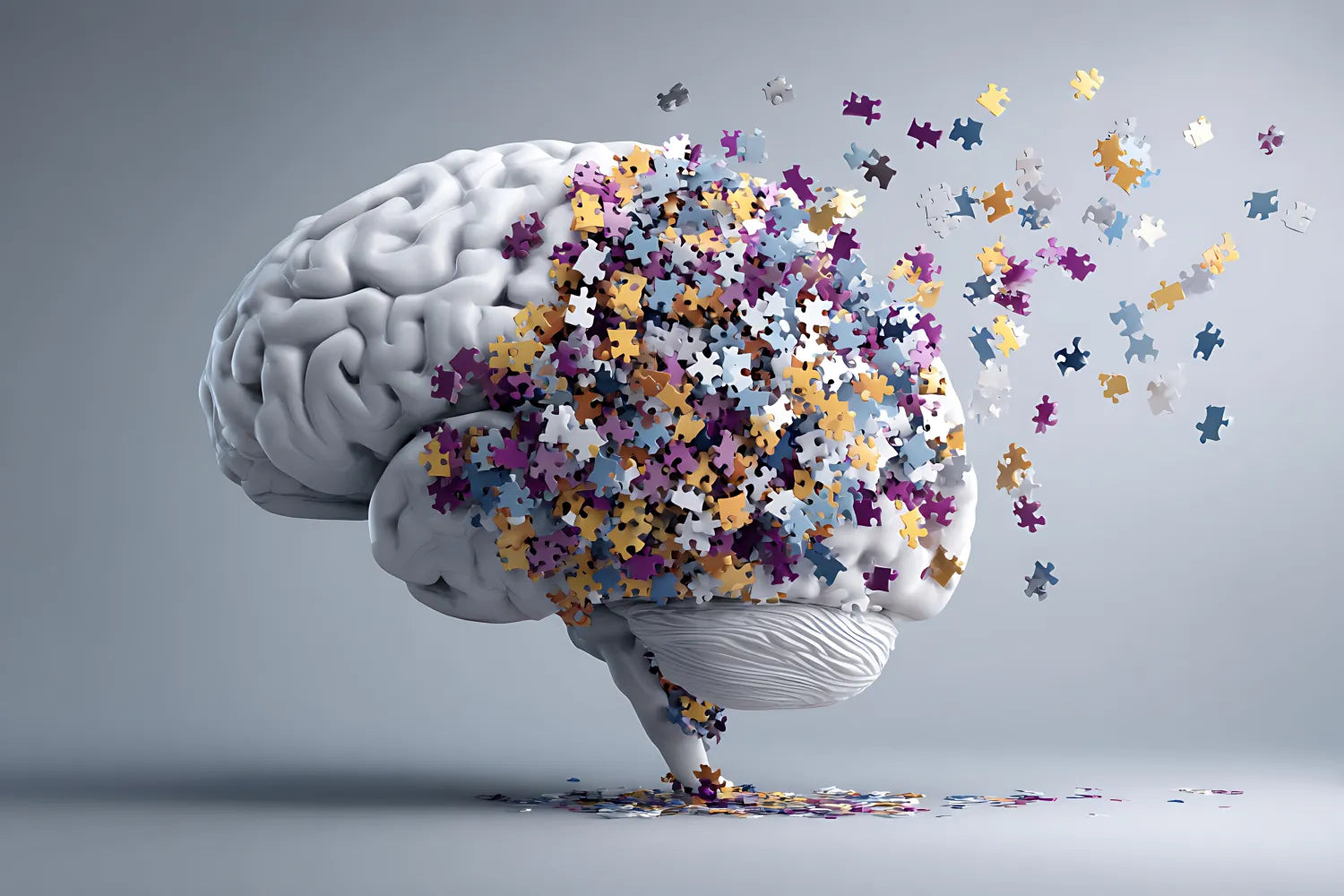
Dr. Eric Venn-Watson’s Highlights
-
The brain and spinal cord control everything from involuntary movement to problem-solving abilities and memory function.
Problems with brain function can result in problems in the rest of the body.
Taking a once-a-day supplement like fatty15 can help support the cells in your brain and body and help improve your ability to stay mentally sharp.
No one likes to think they’re losing their edge, but aging can make you feel like you’re always a step behind your peers.
In this article, we’ll discuss how the brain functions, what areas of the brain control which functions, and how you can support your cognitive abilities as you get older.
What Is Brain Function?
Brain function simply refers to the ability of the brain to effectively carry out its necessary processes and keep the body in a state of balance or homeostasis. It does this through a complex messaging system called the nervous system.
Basic Brain Anatomy
The brain is highly organized, even if you feel a little less than together. There are two hemispheres, the left hemisphere, and the right hemisphere. Each hemisphere is divided into four lobes:
- Frontal lobe
- Temporal lobe
- Parietal lobe
- Occipital lobe
The two cerebral hemispheres are joined by the corpus callosum, which helps both hemispheres communicate with one another.
The brain's surface is covered by billions of neurons (brain cells) and glial cells, called glia (non-neural cells also located in the brain), and is referred to as the cerebral cortex. It is also sometimes referred to as gray matter.
White matter is located deep within brain tissue. It consists of nerve fibers called axons and nerve cells. These are covered with myelin, a protective covering that also helps with the speed of electrical signals within the brain between its neurons.
The brain is organized so that each part has a specific job that coordinates with a bodily function or process. The nervous system stimulates these processes.
What Is the Nervous System?
The nervous system includes two main parts: the central nervous system (CNS), and the peripheral nervous system (PNS). These parts are made up of billions of neurons, which are specialized nerve cells.
- The CNS includes the brain and spinal cord, which are connected by the midbrain, pons, and medulla.
- The PNS includes the spinal nerve cells found everywhere else in your body.
These cells collect information and send that information back to the brain and brainstem. Thus, the two parts of the nervous system are constantly communicating with one another to function properly.
The Peripheral Nervous System
The peripheral nervous system can be broken down further into the somatic nervous system and the autonomic nervous system.
The autonomic nervous system can be broken down into the sympathetic nervous system, the parasympathetic nervous system, and the enteric nervous system.
All of these systems relay information collected from external and internal stimuli back to the CNS. The CNS then processes the information and makes needed adjustments to keep the body balanced and regulated.
Understanding the Functions of the Brain
The brain controls everything and is part of the central nervous system. All parts of the brain are involved in the collection and processing of information, the storage of data, and the responses to the information collected by the peripheral nervous system.
Here, we’ll cover some of the brain's main functions and talk about the areas of the brain that control them.
Cognitive Function
An obvious part of brain function is collecting data, processing it, and acting on it. Cognitive function controls how quickly we respond to situations, our thoughts, memories, and the ability to recall information we’ve previously learned and stored.
The frontal lobes, cerebellum, and basal ganglia are parts of the brain involved with cognitive function. Issues with these areas can result in diseases like Alzheimer’s Disease, dementia, or even just slower, more labored thinking.
Motor Function
The brain also controls your movement. There are several different parts involved with moving the many parts of your body.
For instance, the brainstem is involved with ocular movement, facial expression, and even swallowing. The cerebellum is involved with fine motor skills, like writing. The frontal lobes and premotor cortex control larger, voluntary movements like moving your arms and legs.
Sensory Perception
Your five senses collect sensory information and send it to your brain to be interpreted as sight, hearing, smell, taste, and touch. The cerebrum controls smell and vision, while the insular cortex is responsible for taste, and the parietal lobes control hearing and touch. These areas are all located in the forebrain.
Involuntary Movements
Your body is in constant motion, and the brain ensures you never have to think about activities like breathing, heart rate, body temperature, blinking, and the like. The brain stem controls these movements, and when the brain stem. Issues with the brain stem can result in conditions like Parkinson’s Disease.
Your brain also controls blood flow within your blood vessels and blood pressure and regulates and adjusts each by constricting your blood vessels and dilating them as needed.
Digestion
Making sure the food you eat is properly broken down and used to fuel your body is also a human brain function. Your brain relies on messages from receptors and nerves located in your digestive tract to stimulate the release of saliva, the production of acid in the stomach, and the muscular contractions of the intestines.
Hunger is largely regulated by the limbic system within your brain, which is made up of the hippocampus and the amygdala.
Stress Responses
The amygdala controls your fight or flight response, which can help you react quickly when you are startled or in danger. These responses can include quickened breath, dilated pupils, the release of adrenaline, and an elevated heartbeat.
Growth and Development
The brain also regulates hormone production and controls how our bodies grow and develop. These functions are controlled by the pituitary gland, which is located at the base of your brain.
Problems With Brain Function
Whether you experience an injury to one of the regions of the brain or whether disease or illness damages it, a neurological issue can impact other parts of the body. Cognitive decline is one of the most common problems with brain function as we age.
Supporting our brain function is a multifaceted process. It includes a balanced diet, plenty of movement, continuing social engagement with our peers, and making smart lifestyle choices (like not smoking).
Another way to support cognitive function? Taking a supplement. Deciding which one might not be as clear-cut.
Which Supplement Helps Support Brain Function Best?
Fish oil supplements have long been the MVPs of the supplement world because they contain omega-3, an essential fatty acid. Essential means our bodies need it to thrive but can’t readily make it on their own.
Although omega-3 can help support blood flow to the brain, it has an Achilles heel. Omega-3 is a polyunsaturated fatty acid, which means it’s a liquid at room temperature and subject to oxidation (or going rancid).
Independent studies showed that more than one in ten bottles of fish oil supplements on store shelves were rancid before they were even sold. Just like omega-3 can go rancid in the bottle, it can go rancid in your body, rendering it ineffective in supporting your brain health.
In addition, omega-3 might not be the best option for supporting cognitive function. Another fatty acid, recently proven to be essential itself, went head to head with omega-3 and proved to be better, broader, and safer than the purest and most effective form of fish oil supplement.
What fatty acid, you ask? C15:0, the only ingredient found in fatty15.
Elevate your cells. Elevate your self.
Buy NowFatty15: The Supplement Your Body (And Your Brain) Will Thank You For
Fatty15 is a breakthrough supplement borne from scientific discovery, containing one pure ingredient, FA15™. This pure, vegan-friendly, sustainably produced, award winning version of C15:0 does a better job of protecting your health than omega-3.* Here’s how.
- Better. In studies, fatty15 had 26 more clinically proven benefits for your body than omega-3. Many of these benefits can calm immune responses, balance our immunity and are neuroprotective.* These benefits also include improved heart, joint and metabolic health and the ability to stop bad cells from proliferating.*
- Broader. Out of 12 cell-based systems studied, fatty15 was able to safely repair 10 of them.* Omega-3 could only repair four.
- Safer. Fatty15 is safe for all 12 cell types, while omega-3 was toxic to four of them, including lung cells and blood vessel cells.
Safer for your body, better for your cells, and broader in its ability to support your body, science supports that fatty15 is simply a more effective supplement than omega-3.*
Stay Sharp, Get Fatty
Taking measures to improve your brain function and take care of your health starts one decision at a time. Making fatty15 a part of your daily health stack is a smart way to support your body, fuel your brain, and support health aging.
Sources:
Nervous System: What it is, Types, Symptoms | My Cleveland Clinic.org
A Neurosurgeon’s Overview the Brain's Anatomy | AANS.org
Revealed: many common omega-3 fish oil supplements are ‘rancid’ | The Guardian

Eric Venn-Watson M.D.
CEO, Co-Founder
Senior Scientist, Co-Founder
Eric is a physician, U.S. Navy veteran, and Co-founder and COO of Seraphina Therapeutics. Eric served over 25 years as a Navy and Marine Corps physician, working with the special forces community to improve their health and fitness. Seraphina Therapeutics is a health and wellness company dedicated to advancing global health through the discovery of essential fatty acids and micronutrient therapeutics.
You May Also Like...
When Does Cognitive Decline Start?
Almost everyone will experience some cognitive decline in their lifetime. Learn which decade is most closely associated with thinking trouble.
List of Cognitive Changes in the Elderly as They Age
Are you wondering where your keys are? Not being able to find them could be due to cognitive changes in your brain as you age.


